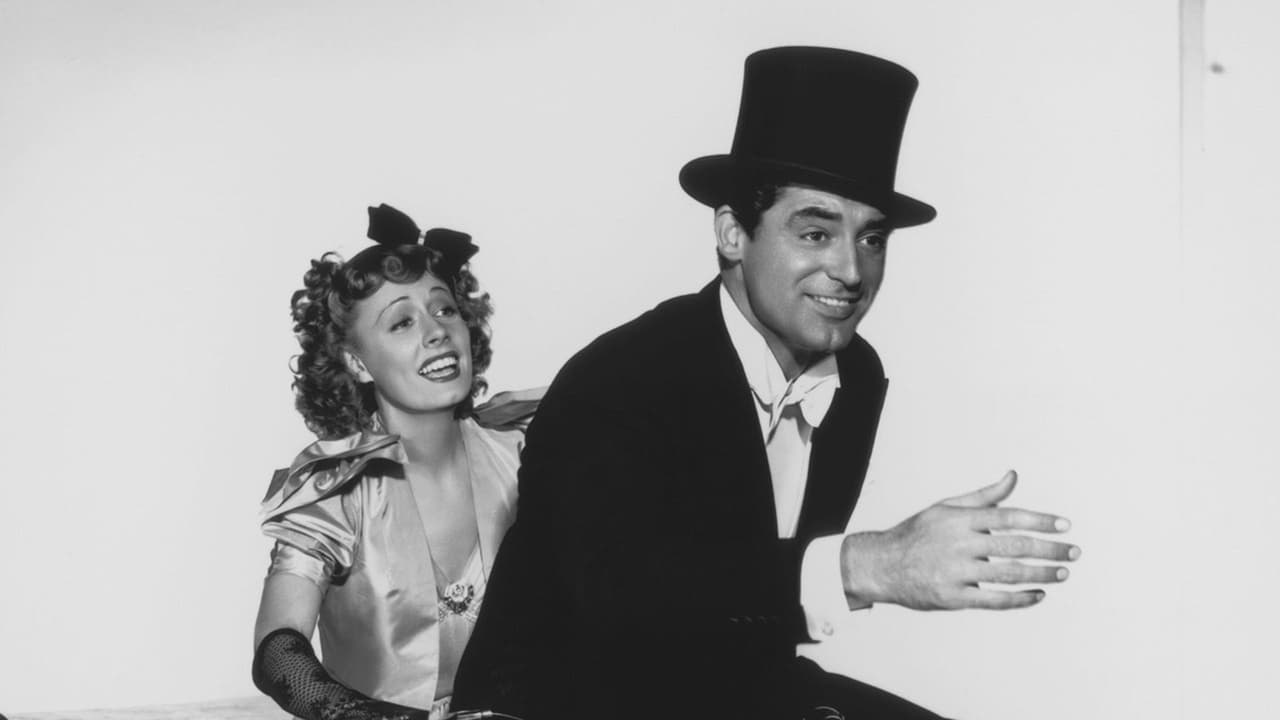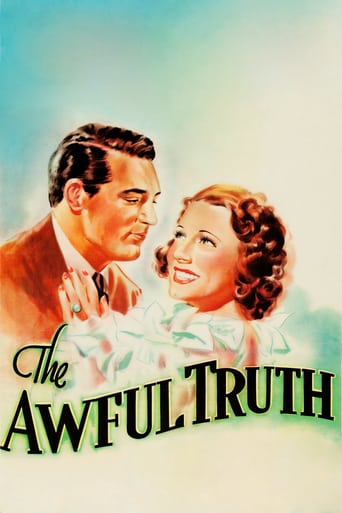

The story goes that director Leo McCarey told his actors to improvise in their comedy, and if it was good, he would use it. Cary Grant was skeptical at first, but then rolled with it. He's very good at comedy in addition to being the gold standard in debonair, and there were a few scenes in 'The Awful Truth' that had me laughing out loud. The most memorable is when he stands behind the door, and after getting bonked on the nose a few times, tickles Irene Dunne with a pencil as she listens to love poetry from her new beau (Ralph Bellamy). You see, Grant and Dunne are in the process of getting a divorce, after he "went to Florida" in order to be with another woman, and she was in a hotel with her voice teacher "because their car broke down". After fighting for custody of their dog, Mr. Smith (Skippy aka Asta), they continue to trade playful barbs and play mischief on one another, sabotaging their new relationships. The movie is full of clever dialog, banter, and general zaniness. It's a little harsh on Okies, showing the cultural divide has always been with us, but it's in funny (and hopefully non-offensive) ways. As cute as that all was, it was the final scene that really made the film for me. In an understated way, it's very sexy, with the tension having been built up from all Grant and Dunne's comments. It's clear they know each other perfectly, still love each other, and want each other. The idea they end up together will hardly come as a surprise, but the execution in that last scene is lovely, with a slow, almost teasing pace, and Dunne looking up at Grant demurely from her bed. McCarey won the Oscar for best director amidst several other nominations for the film, and while it's not the best of romantic or screwball comedies, it's very good, and well worth watching.
... View MoreA Leo McCarey production. Copyright 15 October 1937 by Columbia Pictures Corp. of California. New York release: 4 November 1937 at the Radio City Music Hall. U.S. release: 21 October 1937. Australian release: 27 January 1938. 10 reels. 92 minutes. Re-made in 1953 as LET'S DO IT AGAIN.NOTES: Leo McCarey won the year's prestigious Hollywood award for Best Directing (defeating William Dieterle's The Life of Emile Zola, Sidney Franklin's The Good Earth, Gregory La Cava's Stage Door, and William Wellman's A Star Is Born). Also nominated for Best Picture (winners in brackets): (The Life of Emile Zola); Best Actress, Irene Dunne (Luise Rainer, The Good Earth); Supporting Actor, Ralph Bellamy (Joseph Schildkraut, The Life of Emile Zola); Screenplay (. . . Emile Zola); Film Editing (Lost Horizon). Number ten in The Film Daily survey for the Ten Best Pictures of 1937.The original stage play starred Ina Claire and Bruce McRae. It opened at the Henry Miller Theatre on 18 September 1922 and ran 144 performances. It was first filmed in 1925 by director Paul Powell. Agnes Ayres and Warner Baxter starred. In 1929 Marshall Neilan directed a sound version starring Ina Claire and Henry Daniel. Arthur Richman himself wrote the screenplay, in collaboration with Horace Jackson.COMMENT: An hilarious romantic comedy, with some of the most amusing situations ever put on film. True, it is very obviously adapted from a stage play and it takes a while to get going (doubtless for the benefit of latecomers). But when Cary and Irene finally decide to get a divorce and she phones her lawyer who expatiates on the joys of marital bliss in between an unseemly quarrel with his own wife, the fun begins. Once started, the script piles one hilarious episode on another and, unlike many other films of this type, it does not run out of steam in the final reconciliation scene, thanks to two ingenious running gags with a door and a clock. McCarey carried off the 1937 award for Best Direction — and deserved it. According to Ralph Bellamy, much of the film was improvised by McCarey on the set. Yet shooting was completed in six weeks! The casting is well-nigh perfect. Cary's role is tailor-made and he makes the most of it, bubbling over with sly humor and delightful reaction shots. Miss Dunne brings the same finesse to her role (which allows her a couple of songs) and although we are practically blinded by soft focus whenever the camera looks her way, she is quite attractively groomed and costumed — which makes a pleasant change from some of her other films. Ralph Bellamy has his usual role of the put-upon "other man", but it still had freshness when this film was made and he plays it with comic expertise. Among the supporting players, all of whom are excellent, special mention must be made of Joyce Compton. Although she figures in only one episode and despite the fact that her singing voice is obviously dubbed, she makes quite an impression.
... View MoreIrene Dunne is wonderful in "The Awful Truth" an actress largely forgotten today I beg movie lovers to watch this movie (and others she has dunne-ha ha) and maybe together we can resurrect her formidable career! I don't waste time on plot, lets talk about the highlights in this achingly funny film: Irene being tickled by Cary, Irene being forced to dance with oaf Ralph Bellamy, Irene passing herself off as Cary's trashy sister and singing the mildly risqué song "My dreams have gone with The Wind". Irene Dunne was delightful, delectable, dynamite and most important durable. She lasts! She sang superbly, acted effortlessly and danced with precision and panache. One of AFI's 25 greatest female stars lets affirm her legacy and make her viable again! Here are some of her other films I have seen: "Show Boat", "Roberta", "My Favorite Wife", "Love Affair". Musical, comedy, drama, heck she even tackled westerns ("Cimarron"). C'mon people! Make the next film you watch an Irene Dunne vehicle! This is Daniel at the movies. Till we meet again don't know where don't know when.
... View MoreIt's nice to see an entertaining love story. A story that is spontaneous, simple and hilarious. THE AWFUL TRUTH is that kind of movie. am delighted by the fact that improvisation of dialogue is so original and funny.In the film, everything seems cheerful and clever, although the topic should not be like that. The moments in which the main characters get serious are rare. The technique is great because I do not remember that someone dared so to force a dialogue. If the revolution dialogue add great improvisation result in this case is excellent. I do not think that this film is a completely sheer comedy. There are contained travesty and mockery, supposed game of movement and language.I'm pretty sure that this movie eagerly embraced today's audience. Thematic would be interesting, but this dose immaturity character would only heightened the effect. I do not think they would have caught the stomach from laughing, but they would certainly enjoy. Set design is not perfect, but at times I was amazed. The acting is phenomenal.Love triangle Grant, Dunne and Bellamy acts hilarious. Cary Grant as Jerry Warriner is sarcastic without being nasty, debonair but not aloof. Grant is a sophisticated comedian. Every line is a cheeky poke. Irene Dunne as Lucy Warriner is funny, glamorous, hoyden and mischievous at the same time. She dominated the competition at a crucial moment. The second part of the film is rightfully hers. Ralph Bellamy (Dan Leeson) was from the beginning an absolute outsider. Jerry in every scene separated him into prime factors. Cecil Cunningham as Aunt Patsy is responsible for the sarcastic tone. Every time in the right moment.The Awful Truth is smart and witty comedy. The famous dialogue with lots of humor and sophisticated situations. McCarey made a great movie.
... View More